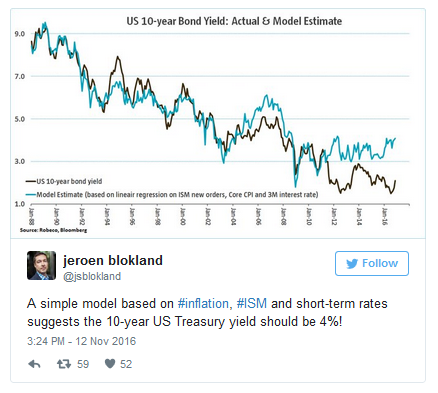Since the election the financial markets have been trying to price in “Trumpflation.” This is the idea that the combination of infrastructure spending, tax cuts, rising deficits, immigration curbs and protectionist policies could reverse the disinflationary trends we have witnessed over the past few decades and more dramatically since the financial crisis. The selloff in the bond market amid surging interest rates might be the single most important piece of evidence in this regard.
Over the summer I noted we were likely witnessing the final blow-off stage of the bond bull market (see this and this). Since then the long bond has fallen nearly 15% leading many pundits to conclude it has already begun pricing in the prospect of Trumpflation. However, if you look at the data, it appears it’s just not pricing in as much deflation anymore. In fact, by some measures the yield on the 10-year Treasury bond would still need to double in order to finish the job.

And if inflation were to actually increase from where it stands currently, yields would need to rise much further than that in order to properly price this in. Think of it this way: If inflation is running at 3-4% and rising, how much of a premium to this number should an investor be paid for tying up his money for 10 years? 1%? 2%? More? Perhaps this is why “bond king” Jeff Gundlach recently suggested the 10-year yield could rise to 6% after Trump’s first term in office.
This is a big deal not just for bonds but for asset classes of all kinds that have been priced in similar fashion over the better part of the last decade. Stocks now have more interest rate risk than they have had for many years, maybe ever. It might be wise to remember the 1994 bond market crash. Just like it has over the past few months, the long bond fell 15% back then, before stocks took notice and fell a quick 10% of their own. Should bonds continue their current selloff, the parallels to 1987 might be more appropriate. The long bond fell 25% during that episode, the final phase of its decline coinciding with the stock market crash that fall.
Either way, the prospect of rising inflation is something the bond market is only beginning to grapple with. It may not even materialize. There’s a good chance Trump will run into a lot more resistance than most market participants currently believe when it comes to his dramatic policy shifts. But if inflation does rear its ugly head again investors may be forced to reconsider the rampant enthusiasm for financial assets that has taken hold since the election.
